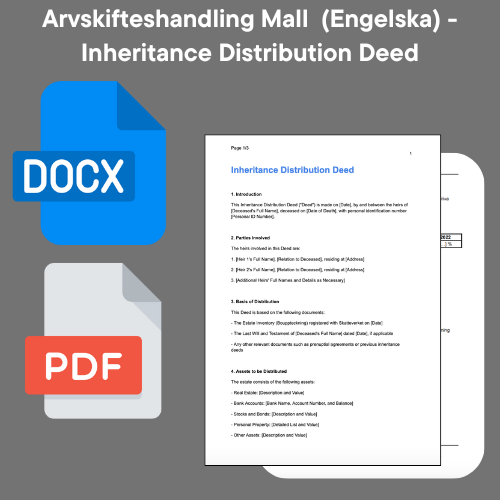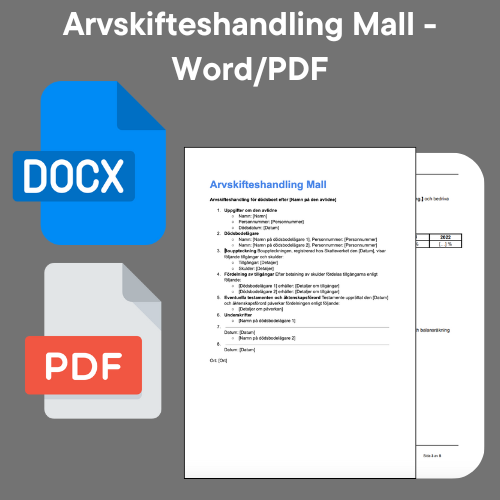Inheritance and Special Children – A Detailed Guide
Share
Table of contents
What is Bodeling?
Property division is the legal process by which the property of the spouses is divided between them in connection with a divorce or when one spouse dies. In a property division, all joint property, also known as matrimonial property, is divided equally between the parties. A central aspect of property division is that it ensures that the surviving spouse receives his rightful share of the joint estate.
Matrimonial property vs. Private property
Matrimonial property is all property that the spouses jointly own and which must be divided equally in the event of property division. Individual property, on the other hand, is property that has either been inherited with a proviso that it must be individual property, or property that has otherwise been specified as individual in, for example, a prenuptial agreement.
What is Inheritance?
Probate is the process by which the assets of the deceased are distributed among the heirs. The transfer of inheritance can be carried out either through an agreement between the heirs or, if they cannot agree, through a forced transfer handled by an estate agent. During the transfer of inheritance, the wills and other possible orders from the deceased are taken into account, and the assets are distributed in accordance with the order of inheritance.
Who is the heir?
According to Swedish law, the primary heirs are the deceased's children, also called breast heirs. If the deceased was married, however, the spouse is the first heir, and the right of the breast heirs to inherit is deferred until the death of the surviving spouse.
Children with special needs and their rights
Separate children are children from a previous relationship, and their inheritance rights are slightly different from those of common children. According to Swedish inheritance law, idiosyncratic children have a strong position, and they have the right to receive their inheritance immediately when their parent dies, even if the parent was married at the time of their death. This is an important right that can often lead to complicated situations in property division and succession.
Special children's right to a team lot
However, a special child's right to inheritance can be restricted by will. A parent can bequeath his property, but not the special-born child's legal lot, which corresponds to half of the inheritance the child would have received if there had been no will. The legal lot is a protected part of the inheritance that cannot be bequeathed.
Property division when Särkull children are involved
When illegitimate children are involved in a division of property and inheritance, conflicts may arise between the surviving spouse and the illegitimate child. This is because the illegitimate child has the right to receive his inheritance directly, which can affect the surviving spouse's ability to keep the home or other property.
Strategies for managing the rights of special children
There are several ways to handle the rights of special children in a way that both respects their rights and the surviving spouse's situation. A common way is to draw up a will in which the surviving spouse receives the right of use to certain property, while the illegitimate child receives his inheritance in the form of other property or financial compensation. In this way, it is possible to avoid that the illegitimate child has to wait for his inheritance, while the surviving spouse is not forced to sell the home or other property.
The will's role in estate division and succession
A well-drafted will can be crucial to ensure a fair and frictionless division of property and inheritance when special children are involved. The will can clearly state how the deceased's property is to be distributed, and it can also include provisions on how the rights of the special children are to be handled.
Legal Documents for Property Division and Inheritance
To facilitate the process of property division and succession, it is important to have access to relevant legal documents. These include property division agreements, wills and probate documents. Having these documents in order can reduce the risk of disputes and ensure that the process goes as smoothly as possible.
The importance of professional advice
Dealing with property division and inheritance, especially when special children are involved, can be legally complex. Therefore, it is often a good idea to seek professional legal advice to ensure that all aspects are handled correctly and in accordance with current legislation.
Summary
Probate and probate are important legal processes that ensure that the deceased's property is distributed fairly among the heirs. When idiosyncratic children are involved, these processes can become more complicated, as idiosyncratic children have special rights under Swedish inheritance law. By understanding the basic principles of estate division and inheritance, as well as by drawing up the necessary legal documents, one can avoid conflicts and ensure a fair distribution of assets.
To facilitate property division and succession, it can be very helpful to use ready-made document templates. These templates are adapted to Swedish legislation and can help ensure that all legal requirements are met.


